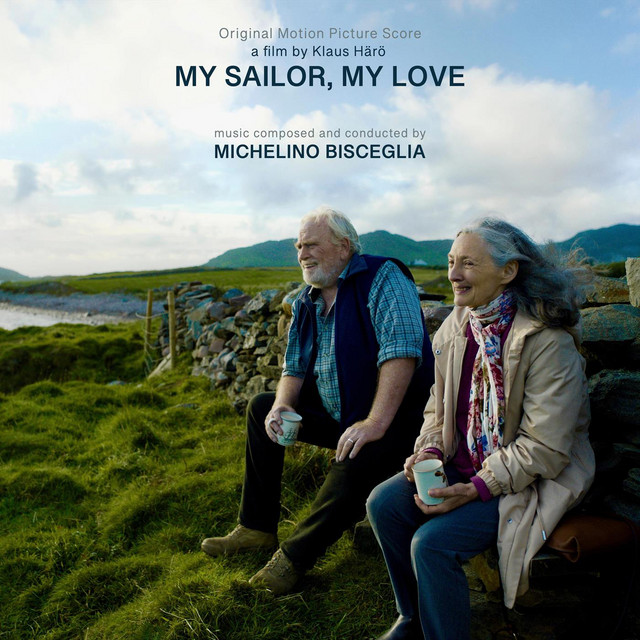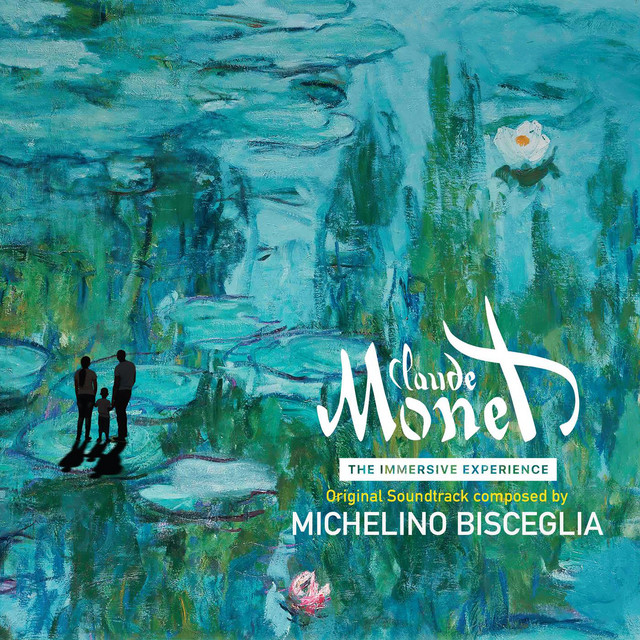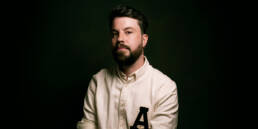
This week, we sat down with the renowned Belgian composer Michelino Bisceglia to discuss his latest project, the soundtrack for ‘My Sailor, My Love, a powerful tale of a second chance at love and the power of redemption, directed by Golden Globe-nominated director Klaus Härö.
We had a look at some of the finer details that make a composer-director collaboration successful, the three main components that inspire Michelino when he is putting together a musical mood board for a film, as well as some of his past and upcoming projects.
Bisceglia has won several awards for his work in film music, including the World Soundtrack Award Public Choice in 2014 for his work on the film ‘Marina’ and a nomination for a World Soundtrack Award in 2022 for his soundtrack on the animation drama ‘Charlotte’, which starred Keira Knightly. Recently Bisceglia received another nomination, this time for “Breakthrough Composer of the Year” by the International Film Music Critics Association (IFMCA).
Let’s chat about your newest release, ‘My Sailor, My Love’. How did you get to work on this film?
The score had to be by a Belgian composer because it was a co-production with Belgium. Klaus Härö, the director, knew a friend of mine, John Engel, who is an American producer based here in Brussels. I think John mentioned my name to Klaus. Klaus then did some research. We have in Belgium a site called Belgian Screen Composers Guild but there are like 64 names on the site, and Klaus told me that he scrolled through all the names because he was looking for a specific profile of a composer.
Finally, I received a call from Klaus and the co-producer and asking me if I was interested to have a talk with the director. I said, ‘yeah, of course’ and then we took time to talk together. It was a great first contact which is also the most important. He sent me over the script, and I loved the script. I was travelling at the time, I was doing some scoring abroad, taking flights and reading the script in the check-in halls. Klaus said, ‘Michel, if you have an idea to try something out, to create something, some theme, or a motif, or whatever that you can present to me that would be great.’
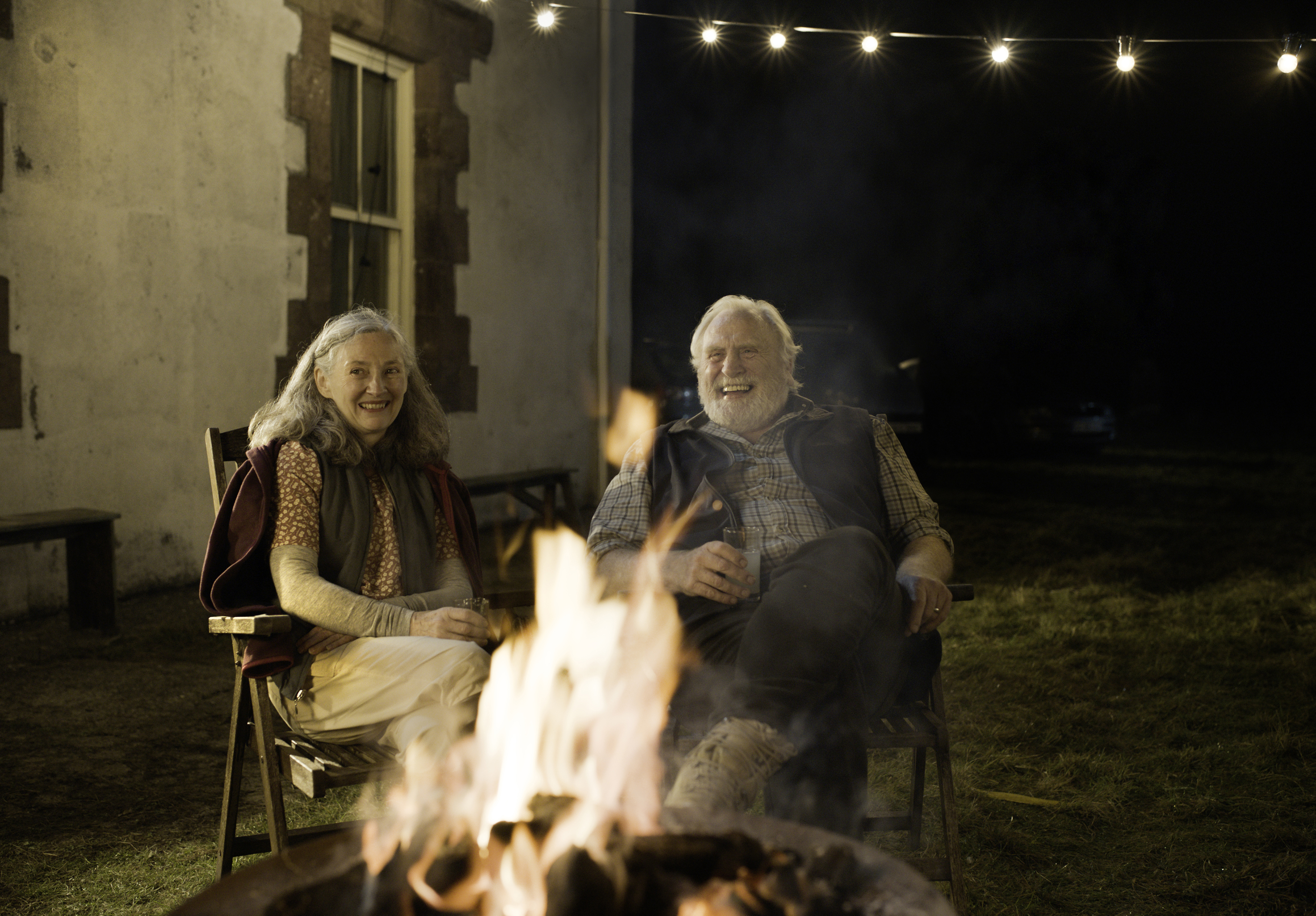 STILL FROM ‘MY SAILOR, MY LOVE’
STILL FROM ‘MY SAILOR, MY LOVE’
When I was reading the script, I thought it was a beautiful story between these two elderly people but it’s the sea that is the fundamental element in this whole story. And that really inspired me, and I started to hear the music – which I do very often in the sense that when I read a script, I feel what it means musically. I sat down and started to compose two themes. I sent them over and then Klaus contacted me and said he liked them very much and he wanted me for the job.
Did the director give you any instructions whatsoever or did you have complete freedom to come up with something?
In the beginning, he didn’t know. He just gave me the script and he was like, “just read it. Let me know if you like it”. Later on, he even came over to my place. We had a lot of conversations; we really took the time to talk. Not only about how the music should be but about how we’re going to work together. You don’t know me. I don’t know you. We are two strangers working intensively together on a project for a specific period of time. But this conversation we had was very fruitful. It was important to set out a base so that we gain some trust and know each other. And we also talked about other stuff, which has nothing to do with the project, just about life, you know? Two strange people, meeting each other and discovering our interests, our taste, our approaches, our way of working.
How much of the score had you written before you saw any shots?
Maybe like 12-13 cues were written before I even saw something. Of course, later I adapted to what it had to be. But we had this very special way of working because Klaus pointed out when we were talking that, ‘Michel, I do not have that much experience with big orchestra productions.’ He didn’t know how to approach that in our collaboration. But me neither. I didn’t know how to. I even said to him the most important words: ‘Listen, you have to give me this opportunity to make mistakes because for me, it’s important to go find the borders – until where can I go?’ If you have a friend and you ask him, ‘please let me make a mistake’, it means you’re asking, ‘please give me some trust, and I need to trust you also.’ It’s in two directions. I think it’s very important. And he understood that right away.
I was kind of creating a mood board, like a basket of music ideas that can be used within the process of editing where I can try some stuff out. And that’s what ended up happening at the end; after the editing process I started to compose additional music.
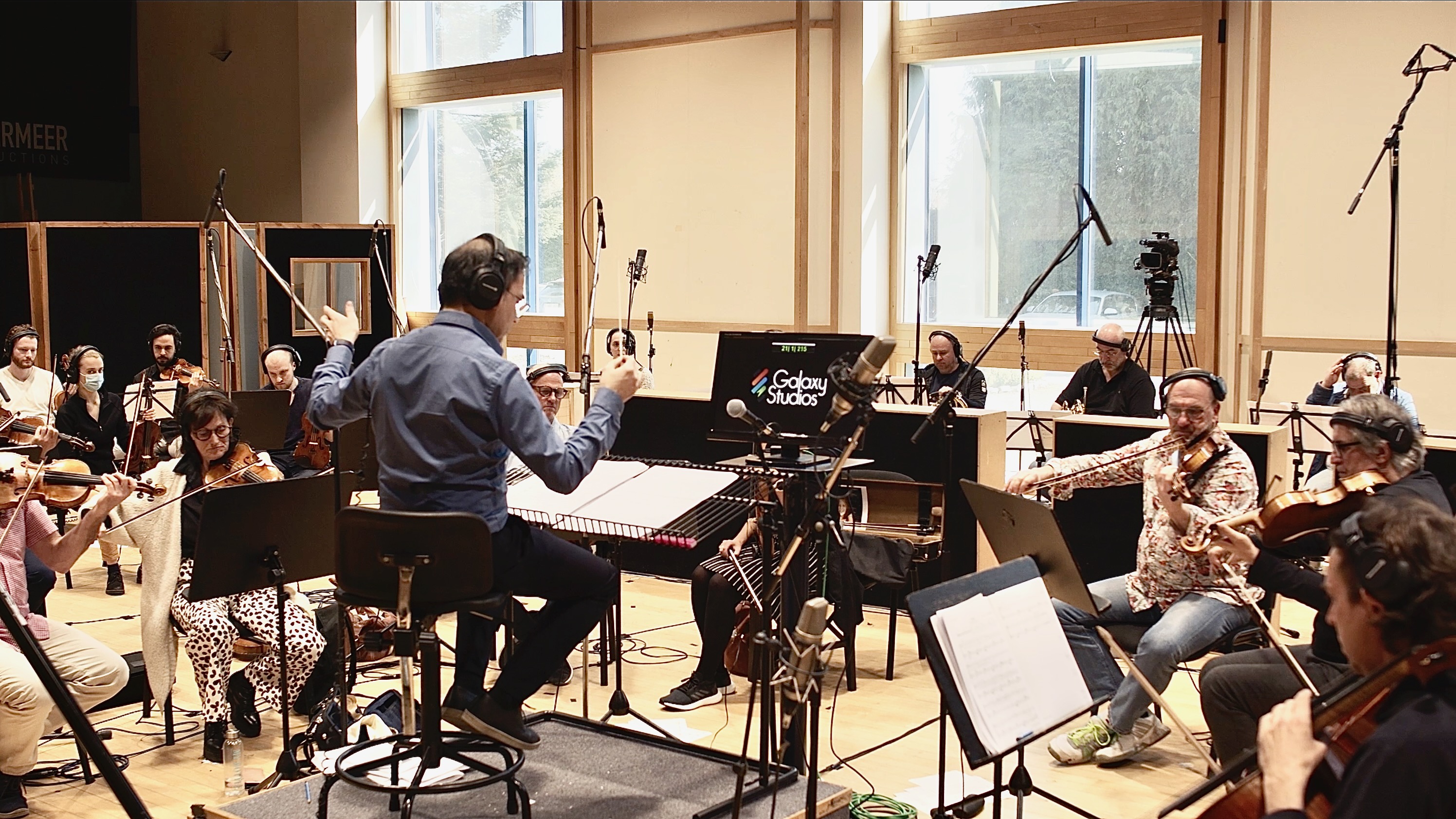 MY SAILOR, MY LOVE’ SCORING SESSION
MY SAILOR, MY LOVE’ SCORING SESSION
‘My Sailor, My Love’ was shot at the same time and on the same island as ‘The Banshees of Inisherin’, but at the 10th of the budget. Has the budget affected at all the musical side? Would you have done things differently?
Well, every €1,000 I will have more, I will spend it on more strings. You will always go to the maximum I would say, but no, I think I could do what I wanted to do and I’m happy with what was available. Sometimes you have no budget, and you still have to be very creative. Of course, it will have an implication on the music. You will have a smaller orchestra, you will have less time to record, etc. But it was clear that there had to be orchestra music so you are speaking about a minimum budget, otherwise, you would never have an orchestra. And that was from day one clear also from his side for Klaus. And that’s also my profile as a composer. I do also some of the electronics, of course, we all get involved in that, but I’m trying to express myself more and I have more fun and joy and challenge working with the orchestra. And that’s maybe the reason why he ended up working with me.
It sounds like the orchestra was the best way to convey the emotions in the movie.
Yes. You know, the sea…it’s a big thing. But the sea can be big, the sea can be small, it can have all kinds of shapes, and that’s what the orchestra also has. It can have big moments, but it can be very intimate. It can be very small. It can be very lovely. It can be very imposing. Although we stayed away from the heaviness. I try to be sentient.
You mentioned you wrote about 12 cues just off the script. But once you saw the images of the landscapes and the people, did that change your musical direction at all?
No. You know what Klaus did? He sent me photos of the location, the sea, and the road where the car drives. So he ‘fed’ me with elements and the script was so clear. Everything was there. On some cues, we did minor changes. And of course, we had to record them, to orchestrate them, but we were very much on the right direction from the first note, which was wonderful. And it was great to have discovered that.
 KLAUS HÄRÖ, MICHELINO BISCEGLIA, AND PATRICK LEMMENS AT ‘MY SAILOR, MY LOVE’ SCORING SESSION
KLAUS HÄRÖ, MICHELINO BISCEGLIA, AND PATRICK LEMMENS AT ‘MY SAILOR, MY LOVE’ SCORING SESSION
It sounds like a healthy and fruitful collaboration.
Yeah, good communication. He directed and steered me in the right direction: which elements were important for him, where to be emotional but not too much, not to drag the emotion. It’s important to have it under control and I think when emotion is well-weighted, it has much more impact than when it’s completely out of control. I think it won’t work and it won’t be credible anymore.
What was the most difficult scene or cue to score?
Well, there was one cue that was the most difficult, but at the end he didn’t use it. [laughs] That was the moment after the little stress Annie and Howard had together when she gets back to Howard’s house and starts to work. He’s mowing the grass and there is a little game: she’s hiding behind the window and he’s crossing and they’re trying to see each other. I had music on that cue. And I was convinced that it could have been supported greatly with music, but we couldn’t find the colour that Klaus was convinced should be used. But he thought it would work without music also. And it works like that. After many tries, at the end, the decision was to do it without the music and I’m absolutely fine with that. And that is also interesting from my side as a composer to try to give you solutions. It’s better to choose from something that you have in your hands, something concrete, than to choose based on something abstract in your mind.
True. But silence can be just as important in a critical model.
Absolutely. And you don’t miss it. If you look at that, it works great. It’s a great play. For me, it was like a dance between Howard and Annie. But it works. It’s without music but it’s still a dance.
Did you find the characters relatable at all?
Yes, I did. Although it’s a story that starts from another story. So, it took time to get into them. But that part in the script was very well written. By reading it, you could really start to sense how they were, what the personalities were, and they were very inspiring also. People at that age are fragile, not only physically but also mentally and emotionally. Klaus was not trying to find elements but handle with care, very delicate.
You mentioned earlier that your biggest inspiration for the film was the sea. What does usually inspire you musically?
People, their character in the first place. What is the personality? Is it soft? Is it with secrets? Is it with strong character? Soft character? Is it the way they talk? The location is also very inspiring. Where is it played? That’s something that I try to catch also in film music because it sets out the environment where the music behaves. It also makes you as a listener or as a viewer get really into the film, on the location itself. Also, the timeline sometimes can be very inspiring. I remember I did a Netflix series some years ago and it [was set in] the 18th century. And it’s very inspiring because it’s a different setting and you have to try to find a sound that matches with that period, but not be old fashioned, not be grabbed too early with the instrument of that period. Because that wouldn’t work. So, I would say those three elements are, for me, where I try to catch my colours, and try to use that as a base.
What is your ideal process? Do you like to score from the beginning to the end or start with larger cues? Or start with the theme, and then develop it?
I don’t have a strict structure to work on, but I would say the queues that are speaking to me the most, where I’ve had an idea immediately, I would definitely start on those. The bigger queues, the longer queues, the queues which will have most of work. Although sometimes you can be wrong; some smaller cues can be very difficult to nail. But usually, I would start on the cues that appease me directly, where I get like a crush on in terms of ideas. I do write without any markup, just on the piano or paper and piano. I try to write my own mood board where this theme could be for this character. Then I write a couple of themes for that period, some couple of themes for that location, some themes for that situation. So have like many colours that I can play with. I’m creating the puzzle [pieces] so I can make the puzzle later on. I always start in the middle somewhere.
One of my favourite projects of yours is ‘Claude Monet: The Immersive Experience’. It also has a cinematic sound; it tells a story and guides you through the exhibition. How different was it to write music for that project as opposed to writing for a film?
It was difficult. It was strange because you don’t have a film. And the producer sent me I don’t remember how many paintings I had to work on. And he sent me the script of how the painting will evolve from one painting to the other one and how it will be set in the room in the exhibition. And that’s it. So, I remember I had Monet’s painting of London with the Thames. And I was trying to look in the painting trying to see something move but nothing moves, of course, it’s just a static painting. [laughs] Although, when you stare at it and you take your time, you kind of imagine it moving. But then also I tried to see, if this was film, what would it be? This is the location, it’s London. We see the Thames and the water is moving, so we have to make it move. And it’s British, so I need some British elements. I tried to invent from myself elements where I could come up with music that is horizontal on a timeframe of 5 minutes.
Another thing that was difficult was that I had to compose that in a very short time. I think this whole project has been scored in two months. I was really running out of time, and I had to really sit down and write. And in this case, again, there’s no film, so the music had to say it all. The development of harmonies and themes was much more complex because it’s only the music that speaks out. You couldn’t hang on one course for some time because it doesn’t work, there’s nothing happening. The music has to move, forward, forward, forward. That was difficult. But yeah, I’m very happy with the result and the exhibition is a huge success.
What would you say is the project you’re most proud of so far?
I love them all. They’re absolutely my babies. [laughs] I don’t want to choose. It’s like when you have three children: which one do you love most? Difficult to say, right? For me, when working on a project I try to go emotionally very far into it. I go to sleep with it, I stand up with it, I have those characters in my mind. It’s like I’m isolated within that. And sometimes I meet the actors at the festival. And I reach out to them, “Hey, how are you doing?” And they’re like, ‘Excuse me?’ [laughs] They don’t know me, but I’ve seen them for two months on my screen.
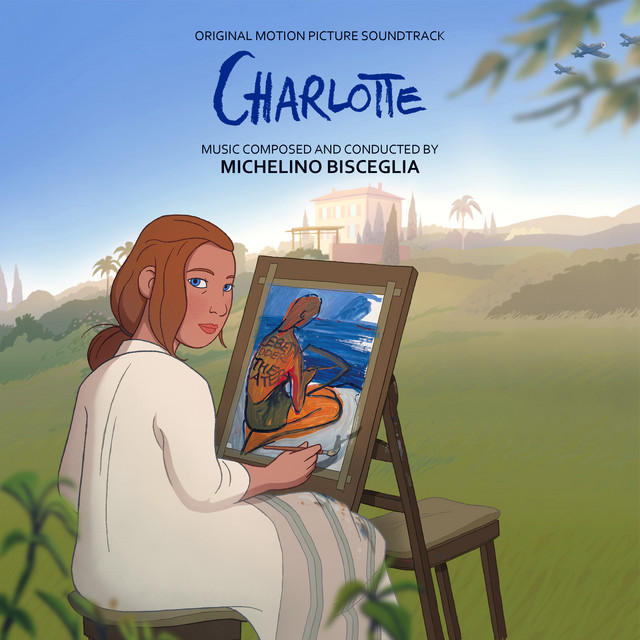
I’ve really enjoyed working on ‘My Sailor, My Love’. I’ve also loved working on ‘Charlotte’, this animation film where Keira Knightley played the voice for this Canadian-British animation film. That was a very emotional film because it’s a very strong story of a girl that just wanted to be an artist and ended up being stuck within the World War with the Nazis and they’re fighting. And at the end ended up being killed to this horrible situation. She was 26 years old. It really struck me.
Another film which I loved working very much on was ‘Marina’. It was awarded by the World Soundtrack Awards, where it won the Public Choice Award in 2014. It’s a young singer-artist character that wanted to be an artist then the father tried to block him and convince him to do other things. It’s emotional, it’s heartbreaking. Just let him go. Let him do it. Go for your dreams, make your dream come true. Which we all want to have in our life, you know?
And ‘Monet’ also. I’m honoured to have been asked to write score music for such an incredible big artist, which has such a big place in history. It’s wonderful.
Do you have any future projects that you’re excited about?
Yes. Now I’m working on a film called ‘Sleep’, from a Dutch director, Jan-Willem Van Ewijk. It’s an American-Dutch road movie. It’s also a heavy drama. It’s a story surrounded by this weapon abuse where innocent people die in the States due to this insane availability of weapons within the society and it’s just crazy. It’s a road movie so the music also evolves within the film, it travels with the character and the location. For that project I already started to compose music ahead. The director wanted to have it also on the set, which is great. And now they are in the editing phase and I think it’s going to be in August that I’m going to be on it to finalize the score. I really look forward to that. I’ve seen already some rushes and it looks great. It’s fantastic.
Will you be using the full orchestra once again?
No, it’s going to be smaller. There will be some string orchestra covering it, but you won’t feel it. And there is some jazz flavor in it because, after the conversation I had with the director, we tried to get this American society where you also feel it in the music and jazz is an important element of the American culture. But, of course, it’s not the exposed jazz. It’s sensible. Very, very delicate, but it’s there. I’m very much looking forward to it.
Stella Lungu
Stella is the Editor-in-Chief of The Cinematic Journal. She is also the Managing Director of Wolkh, a PR, Marketing and Branding agency specializing in Film, TV, Interactive Entertainment and Performing Arts.
An Interview with Anna Drubich
Anna Drubich is a Russian-born composer of both concert and film music, and has studied across…
A Conversation with Adam Janota Bzowski
Adam Janota Bzowski is a London-based composer and sound designer who has been working in film and…
Interview: Rebekka Karijord on the Process of Scoring Songs of Earth
Songs of Earth is Margreth Olin’s critically acclaimed nature documentary which is both an intimate…
Don't miss out
Cinematic stories delivered straight to your inbox.
Ridiculously Effective PR & Marketing
Wolkh is a full-service creative agency specialising in PR, Marketing and Branding for Film, TV, Interactive Entertainment and Performing Arts.
